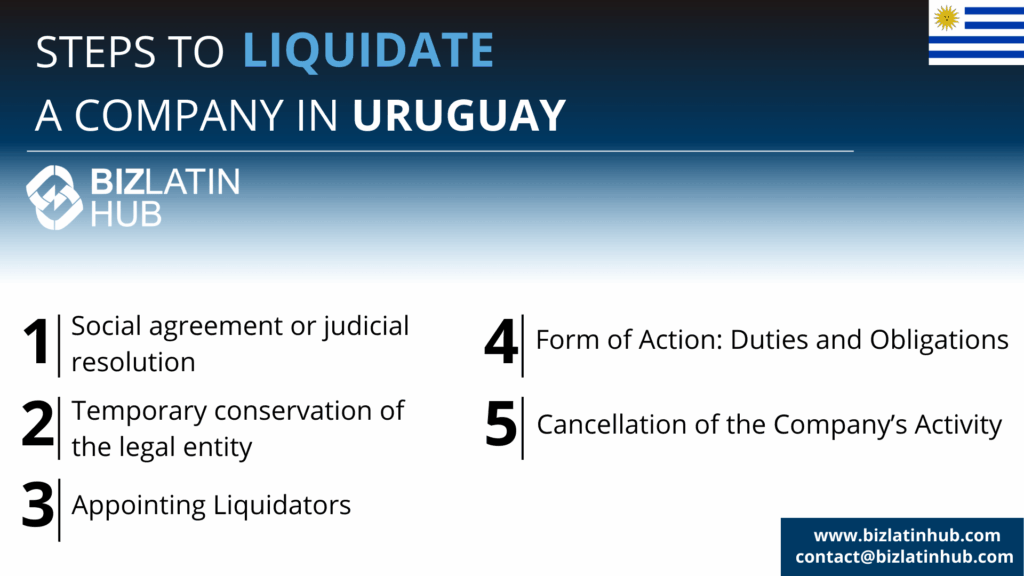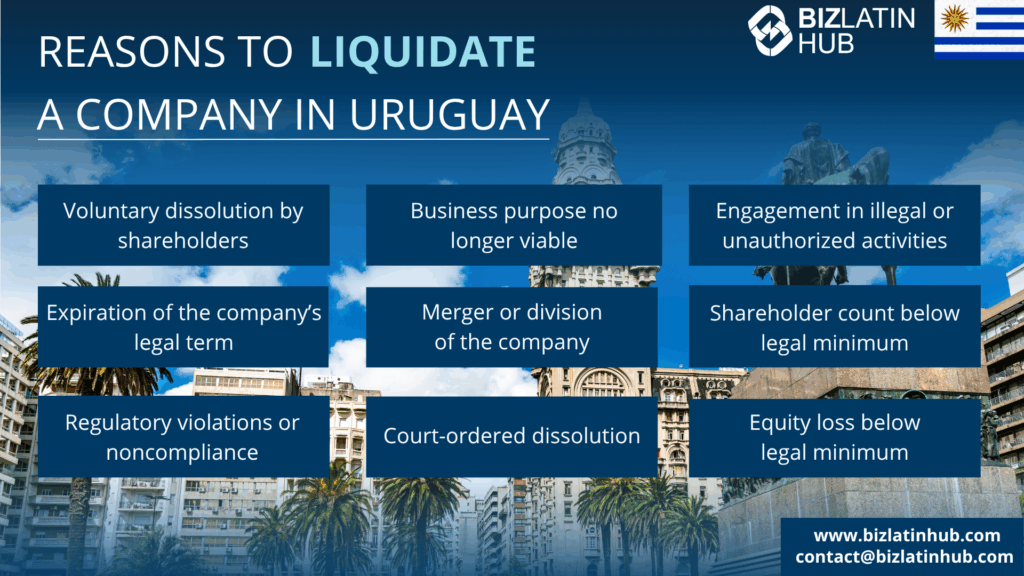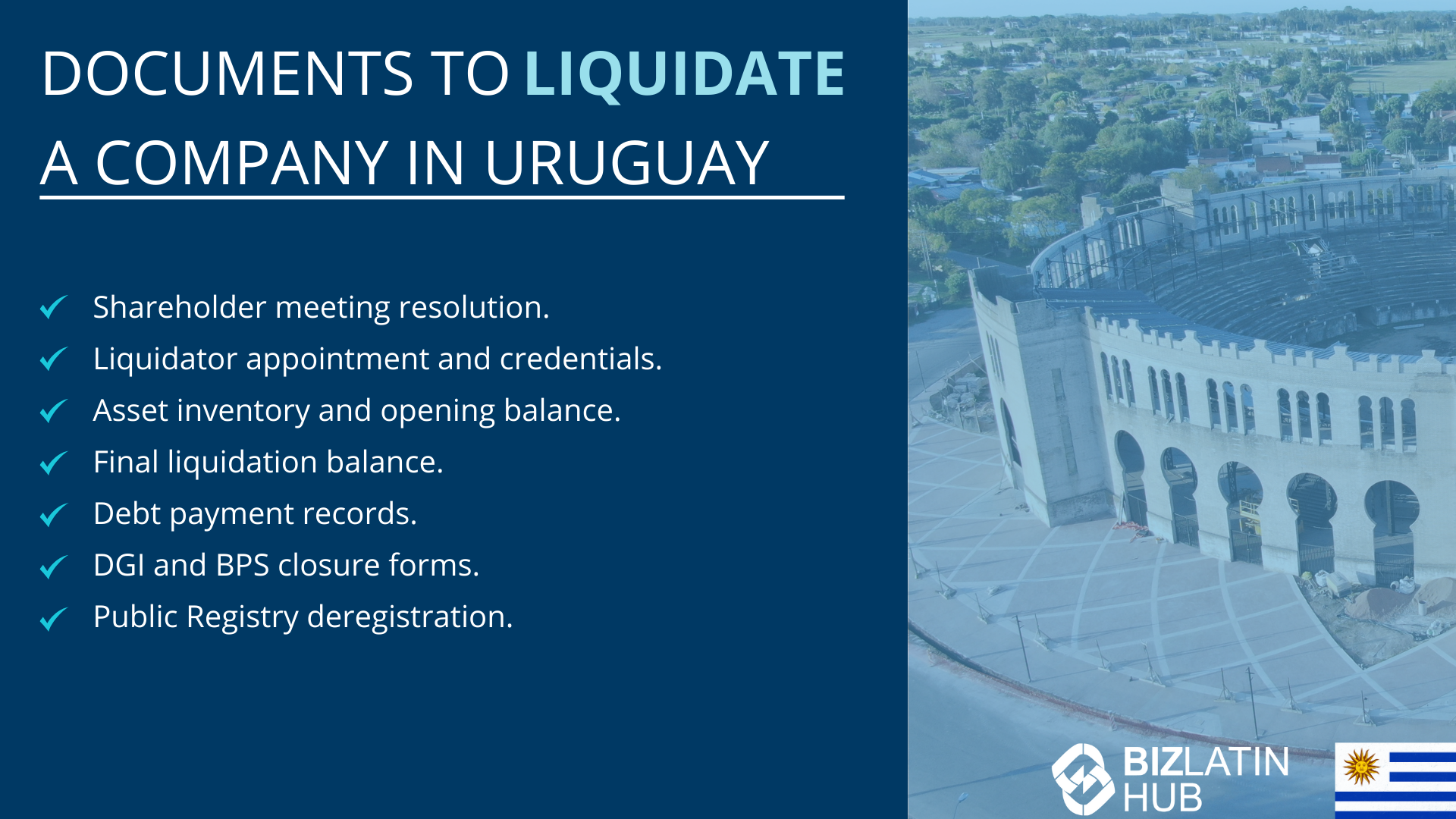If you’re considering exiting the market, you’ll need proper legal support to navigate the steps to liquidate your company in Uruguay. While Uruguay remains a stable and popular destination for company registration, not every venture goes as planned. Under Commercial Companies Law (Law No. 16.60), all entities must first dissolve before proceeding with liquidation. Below, we walk you through the legal dissolution and liquidation process, including shareholder rights, timelines, and compliance requirements.
Key takeaways on how to liquidate your company in Uruguay
| 5 steps to liquidate a company in Uruguay | 1. Social agreement or judicial resolution 2. Temporary conservation of the legal entity 3. Appointing liquidators 4. Form of action: duties and obligations 5. Cancellation of the company’s activity with tax and labor deregistrations |
| How long does it take to liquidate a company in Uruguay? | The process typically takes between six months and one year, assuming the company is in good standing and all documentation is available. Delays may occur due to incomplete filings, tax inconsistencies, or registry processing times. |
| What are the reasons to liquidate a company in Uruguay? | Companies may choose or be required to liquidate for the following reasons: Shareholders’ decision to voluntarily dissolve Expiration of the company’s legal term as stated in its bylaws Regulatory noncompliance or violation of legal obligations Business purpose is no longer viable or achievable Judicial order based on litigation or creditor petition Severe financial losses reducing net equity below one-quarter of the capital Corporate merger or division Reduction of shareholders below minimum legal requirements Involvement in illegal or unauthorized activities |
| What causes involuntary liquidation in Uruguay? | Involuntary liquidation may be triggered when: A court determines the company is insolvent or has ceased lawful operations The entity fails to comply with tax, labor, or social security laws Partners breach fiduciary duties or administrative obligations A creditor or authority files a petition for compulsory liquidation due to unresolved liabilities |
Stages of the Liquidation process
Step 1 – Social Agreement or Judicial Resolution
The process begins with a decision by shareholders at an Extraordinary General Meeting or through judicial order. This resolution must authorize company dissolution and initiate liquidation.
Required documents:
- Notarized shareholder resolution
- Updated company bylaws (if amended)
- Proof of quorum and meeting minutes
Tip: Ensure your bylaws permit liquidation and clearly define voting thresholds.
Step 2 – Temporary Conservation of Legal Entity
Upon dissolution, the company retains its legal identity for the purpose of completing liquidation. The name must include “en liquidación” on all documents and filings.
Important: Failing to register this change or misusing the legal name exposes directors and liquidators to personal liability.
Step 3 – Appointing Liquidators
Once the decision to liquidate is made, the company must appoint one or more liquidators within 30 calendar days from the date of dissolution. The liquidator assumes full legal responsibility for winding up company operations and complying with all regulatory requirements.
Key points to include:
- Appointment method: The liquidator is appointed via shareholder resolution (typically by majority vote in accordance with the company’s bylaws). If shareholders fail to appoint a liquidator within the timeframe, any interested party can request judicial intervention to nominate one.
- Registration: The appointment (and any subsequent termination or replacement) must be registered with the National Registry of Commerce (Registro Nacional de Comercio).
- Legal powers: The liquidator(s) assume the functions of the board of directors and have the authority to represent the company in all civil, administrative, and legal proceedings during liquidation.
- Initial deliverables: Prepare an inventory of company assets and liabilities within 30 days of appointment (can be extended to 120 days via shareholder resolution).
- Prepare an initial balance sheet, identifying all tangible and intangible assets (e.g., real estate, vehicles, IP, cash) and liabilities (taxes, payroll, commercial debts, litigation risk).
- Notify the DGI (tax authority) and BPS (social security bank) of the liquidation status.
Tip: If multiple liquidators are appointed, clarify whether they act jointly or separately in filings. Miscommunication can delay document acceptance at notarial and registry levels.
Step 4 – Form of Action: Duties and Obligations of the Liquidator
Once appointed, the liquidator assumes full authority to wind down the company. Their key responsibilities include:
- Completing pending operations: Finalize all existing contracts and obligations from before dissolution.
- Avoiding new business activities: Only transactions necessary to facilitate liquidation (e.g. asset sales) may be initiated.
- Selling assets and settling debts:Dispose of company assets, using public or private sale depending on asset type.Prioritize labor, tax, and creditor payments.If assets are insufficient, request contributions from shareholders per the company’s bylaws.
- Reporting obligations:Submit quarterly progress reports to shareholders.Prepare annual financial statements if liquidation takes more than one year.Draft the final balance and asset distribution plan.
- Distributing remaining assets:Share the final distribution plan with shareholders.If no objections are raised within 30 days, proceed with disbursement.
Tip: Maintain thorough records of asset sales, debt payments, and shareholder approvals to avoid regulatory delays in final closure.
Step 5 – Cancellation of Company Activity
After completing all settlements, the liquidator must:
- File tax and social security closures with DGI and BPS
- Finalize all public deregistrations at the Registro Público de Comercio
Documents required:
- Final liquidation balance
- Confirmation of zero outstanding liabilities
- Distribution plan signed by liquidators
Recommendation: Archive final approvals, closure certificates, and tax clearances for a minimum of 5 years.

Liquidating your company in Uruguay: dissolution stage
Dissolution is the first step to liquidate your company in Uruguay. During this step, the company may only carry out activities aimed at its liquidation. The expression “in liquidation” is added to the company’s name.
Initiate the dissolution of your company
Companies can dissolve for the following reasons:
- Decision of the partners to dissolve and liquidate (in accordance with their legal entity type)
- Expiration of fixed-term shelf life of the company.
- Failure to comply with legal and company compliance regulations.
- Realizing the corporate purpose as unachievable.
- Judicial decision to liquidate.
- Losses that reduce equity to less than a quarter of the total integrated social capital.
- By merger or division, in accordance with Uruguayan law.
- An irreparable reduction in the number of partners (e.g. Limited Liability Companies)
- The company has or is conducting an illegal or prohibited activity, distorting corporate purpose.
Companies in Uruguay must identify a cause for dissolution, a social agreement or a judicial resolution in order to liquidate.
Shareholders have the right to be kept informed throughout the liquidation process, being able to oppose in certain cases the resolutions adopted by the liquidators. They also have the right to be awarded remaining assets, as is appropriate.
Shareholders retain important rights throughout the liquidation process:
- Access to information: Must be informed of liquidation status, final balances, and asset distribution.
- Voting and objections: May approve or reject the distribution plan. Silence after 30 days is considered approval.
- Recourse: If misconduct occurs, they may initiate judicial intervention to remove or supervise liquidators.
- Right to reimbursement: Entitled to receive a proportional share of residual capital after all debts are settled.

FAQs for liquidating an entity in Uruguay
Based on our extensive experience these are the common questions we receive from clients about liquidating an entity in Uruguay.
1. What is the official process to liquidate a company in Uruguay?
It begins with company dissolution through shareholder resolution or court order. Liquidators are then appointed to settle debts, liquidate assets, file tax and social security closures, and submit deregistration paperwork. The company ceases to exist once the Public Registry accepts the closure.
2. How long does liquidation take in Uruguay?
Generally, 6 to 12 months. Timelines depend on:
Delays in public registry or DGI response times
Whether books are up to date
Asset complexity
Number of creditors
3. Why do companies voluntarily liquidate in Uruguay?
Common reasons include:
- End of business cycle
- Exit from the local market
- Shareholder dispute
- Legal structure no longer suitable
- Merger or acquisition strategy
4. Can a company be forcibly liquidated?
Yes. A court may order liquidation due to:
Shareholder deadlock or illegal management practices
Insolvency or debt default
Regulatory noncompliance
Criminal activity
5. What documents are required during the process?
Shareholder meeting resolution
Liquidator appointment and credentials
Asset inventory and opening balance
Final liquidation balance
Debt payment records
DGI and BPS closure forms
Public Registry deregistration
6. What is the role of the liquidator?
The liquidator oversees all financial, legal, and administrative aspects of closure. Their main responsibilities include:
- Paying creditors
- Selling assets
- Handling filings
- Distributing surplus to shareholders
They may be personally liable for misconduct or delays.
7. Can a liquidated company re-enter the market?
No. Once deregistered, the legal entity ceases to exist. However, a new company may be created using the same shareholders, business name (if available), or concept—subject to new registration.

Liquidate your company in Uruguay with support from Biz Latin Hub
Liquidating your company in Uruguay requires strict adherence to legal procedures and financial obligations. At Biz Latin Hub, our bilingual team provides full legal and accounting support to help you exit the market compliantly and confidently. Contact us today for a customized consultation on your company liquidation strategy.
At Biz Latin Hub, we create trust in our clients by connecting them with our team of local and expatriate professionals. We provide services enter and exit the market, including liquidation services for companies. We operate with the highest quality and integrity to ensure that the companies fulfill their corporate obligations and can leave the market without delay or penalty.
Contact our specialists in Uruguay today and receive personalized assistance on your exit strategy.
Learn more about our team and expert authors.






